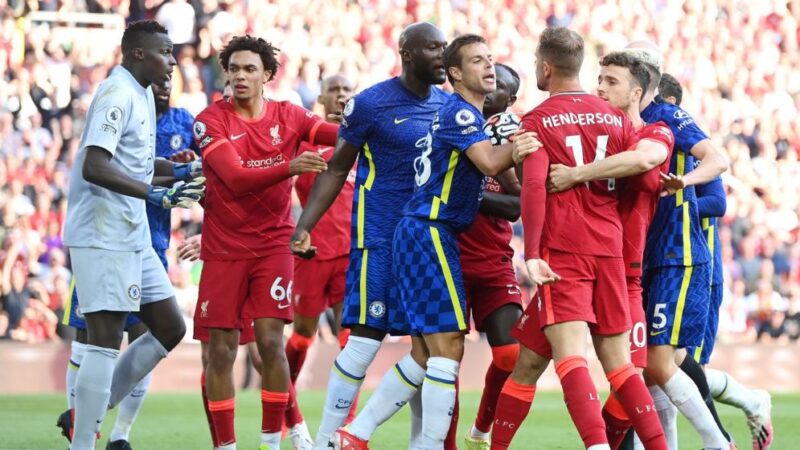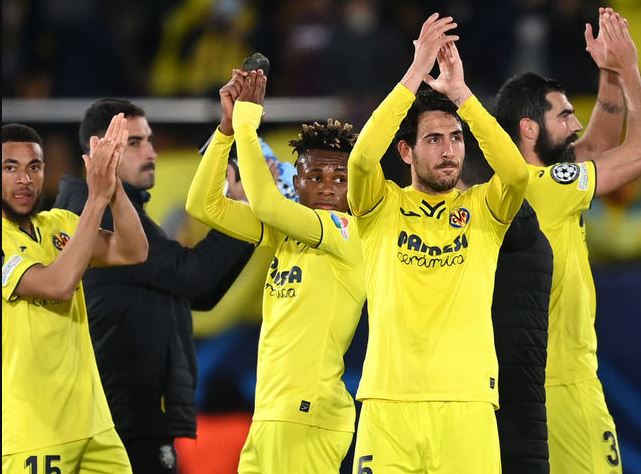Top 5 Chelsea Biggest Rivals

Chelsea Football Club is a professional soccer team based in Fulham, West London, England. They are currently competing in the Premier League.
Chelsea won their first major trophy, the League championship, in 1955. Plus the FA Cup in 1970, the Cup Winners’ Cup in 1971, and the Club World Cup in 2021.
They’re the first English club to win all three main European club competitions before 1999. Also, they have secured different domestic titles, including six league championships and eight FA Cups.
On the international level, they have won the UEFA Champions League and the FIFA Club World Cup. Overall, Chelsea ranks among the top clubs in English football history in terms of trophies won.
READ ALSO: Top 5 Arsenal Biggest Rivals
But,
Who Are The Greatest Chelsea Rivals?
1. Arsenal F.C.

One of Chelsea F.C.’s greatest rivals is Arsenal F.C. This rivalry has gained attention due to the clubs’ proximity and their positions as two of the most successful teams in London.
Matches between them draw large crowds and have a history dating back to the 1930s. In recent years, this rivalry has intensified, particularly with Chelsea’s rise to the top tier of English football in the 2000s.
The competition between the two for the Premier League title heightened the significance of their encounters. According to surveys and fan opinions, while Arsenal fans primarily consider Manchester United and Tottenham Hotspur as their main rivals, Chelsea ranks as a significant adversary.
Conversely, Chelsea fans often identify Arsenal as their primary rival, alongside traditional rivals Tottenham and Fulham.
Historically, Arsenal has dominated the head-to-head record, winning more games than Chelsea. However, Chelsea has had notable victories, including in major finals such as the FA Cup and Europa League.
The rivalry has been fueled by some incidents, including high-scoring matches and controversial transfers between the clubs’ players.
Matches have seen intense competition on the field and occasional confrontations off it. Several players and managers have been associated with both clubs over the years, with players like Ashley Cole and Cesc Fàbregas, Peter Cech have moved between Arsenal and Chelsea.
2. Liverpool F.C.

The Chelsea F.C.–Liverpool F.C. rivalry is a long-standing feud between English football clubs Chelsea and Liverpool.
This rivalry intensified in the early 2000s due to frequent clashes in cup competitions like the FA Cup and UEFA Champions League.
Both clubs have met in several major cup finals, with Liverpool holding the edge in victories. Over the years, Chelsea and Liverpool have faced off numerous times in different competitions, sparking intense encounters and memorable moments.
Notable matches include the 2005 League Cup final, where Chelsea emerged victorious, and the 2019 UEFA Super Cup, won by Liverpool on penalties.
The rivalry was fueled by major events, such as Chelsea’s takeover by Russian billionaire Roman Abramovich in 2003, increasing the club’s competitiveness.
The managerial rivalry between José Mourinho and Rafael Benítez also kindled tensions, with both teams vying for dominance in domestic and European competitions.
One of the most controversial moments in the rivalry occurred in 2005 when Liverpool defeated Chelsea in the Champions League semi-final, helped by a disputed goal known as the “ghost goal.”
This incident deepened enmity between the clubs and their supporters. The rivalry also saw high-profile transfers, including Fernando Torres’ move from Liverpool to Chelsea in 2011.
In recent years, while the rivalry has cooled down, matches between Chelsea and Liverpool remain fiercely contested. Liverpool has enjoyed success in major finals against Chelsea, including the 2019 UEFA Super Cup and the 2022 EFL Cup and FA Cup finals.
READ ALSO: Top 4 Aston Villa F.C. Biggest Rivals
3. Tottenham Hotspur F.C.

The Chelsea F.C.–Tottenham Hotspur F.C. rivalry is one of the biggest rivalries In the English Premier League. Both clubs have important histories and passionate fan bases.
In the early 20th century, the rivalry arose in the 1967 FA Cup final, the first all-London FA Cup final, where Tottenham won.
Despite not being considered main rivals initially, the intensity between the clubs grew over the years, fueled by notable encounters and on-field brawls.
The rivalry intensified during the 1974–75 season when both teams battled against relegation from the First Division.
Chelsea’s dominance in the 1990s and early 2000s also fueled the rivalry, though Tottenham secured significant victories, including a league cup win in 2008.
The rivalry peaked in 2016 during a fiercely contested match called the ‘Battle of the Bridge.’
This match, described by heated on-field clashes and a contentious draw, ultimately impacted the Premier League title race.
Recent meetings have maintained the rivalry’s intensity, with both teams securing victories and facing disciplinary actions due to on-field incidents.
These incidents include racist behavior allegations and managerial clashes. As of November 2023, Chelsea holds a favorable head-to-head record against Tottenham in league, FA Cup, and EFL Cup competitions.
Additionally, Chelsea has accumulated a greater number of domestic and international honors compared to Tottenham.
READ ALSO: Who Is West Ham’s Biggest Rival?
4. Leed United F.C.

The rivalry between Chelsea and Leeds United is like a tale of two cities, each with its style and passion for football. Chelsea and Leeds have clashed on the football pitch for decades, creating a rivalry soaked in history and intensity.
Going back to the 60s and the rugged 70s matches between Chelsea and Leeds were always fiery affairs. The players battled it out on the pitch with tough tackles and fierce competition, often resulting in heated arguments and occasional brawls.
The 1970 FA Cup final between the two teams is one of the most physical and controversial matches of all time. But it wasn’t just the players who clashed; the fans added fuel to the fire.
Chelsea’s notorious Headhunters and Leeds’ fearsome Service Crew were known for their rowdy behavior off the pitch, turning matches into battlegrounds of tribal loyalty and territorial pride.
Even during periods when both teams were struggling on the field, the rivalry never lagged. Whether it was in the lower leagues or during cup competitions, whenever Chelsea and Leeds crossed paths, it was always a fiercely contested affair, with both fans eagerly anticipating the chance to claim bragging rights over their rivals.
5. Fulham F.C.

The rivalry between Chelsea and Fulham, known as the West London Derby, originates from their geographical proximity rather than historical clashes for major titles.
It originated in 1904 when Chelsea was formed after a dispute over the rent of Fulham’s ground, leading to the establishment of a new club by businessman Gus Mears.
Despite occasional high-profile encounters, such as in the inter-war years, both clubs have often operated in separate divisions, limiting the intensity of their rivalry.
Over time, Chelsea’s success in the 1960s, 1970s, and from the mid-1990s onwards contrasted with Fulham’s periods in lower divisions, shifting the focus of both clubs towards other rivals.
Matches between Chelsea and Fulham have intermittently sparked interest, particularly when they were in the same league, but their encounters have been fewer compared to other London derbies.
Fulham’s return to the top division in 2001 briefly reignited the rivalry, with matches like Fulham’s 1-0 victory in 2006, although crowd trouble marred the event.
Regardless of the occasional encounters, including a 1-0 win for Chelsea in their latest clash in January 2024, the Chelsea-Fulham rivalry lacks the sustained intensity seen in other London derbies.
While both clubs have developed rivalries with different teams over the years, for Fulham supporters, matches against Chelsea often carry a ‘David vs Goliath’ sentiment due to Chelsea’s greater success.

Kenny is an experienced blogger and sports writer who majors in soccer articles amongst other trending niches. Do well to stay updated with his updates and that of his team of editors on Readsoccer.



